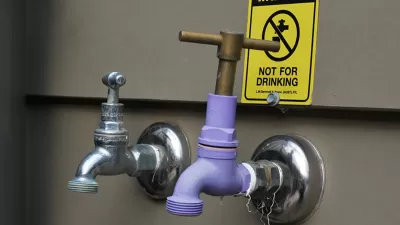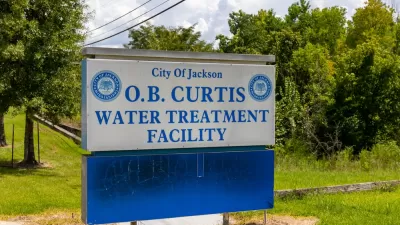Pretty Prairie has water with very high levels of nitrates, and lots of farmers that need to use nitrates if they want to keep the local economy going.

This month’s issue of Harper’s has a long piece by Elizabeth Roye that’s worth reading just for its exploration of how difficult it is for rural areas to provide clean drinking water for their small populations when their way of life is already threatened.
It takes place in Pretty Prairie, Kansas, where the content of nitrates in the water—due to fertilizer used on farmland that comprises over 90 percent of the land—has, for decades, exceeded the limits established by the EPA.
A reverse-osmosis plant has always been only barely feasible economically, but as Royte learns, trying to get the farmers to stop using as much fertilizer is an equally challenging proposition: “Less fertilizer means lower yields, and if farmers earn less, they might default on loans, exacerbating the shrinking of the town.”
In the end, a place with 320 ratepayers has now borrowed enough to build a plant that can remove nitrates from the water, and the town clerk tells Royte, with relief, that they will never have to worry about water again.
“That may be true,” Royte writes, “but I suspected Brace’s sense of relief—and the community’s—was related more to social, rather than civil, engineering. A decision had been made: the farmers would do their best, within the bounds of their economies, and the townsfolk—with a onetime boost from the feds—would continue uncomplainingly to clean up after them.”
FULL STORY: Drinking Problems

Montreal Mall to Become 6,000 Housing Units
Place Versailles will be transformed into a mixed-use complex over the next 25 years.

Planetizen Federal Action Tracker
A weekly monitor of how Trump’s orders and actions are impacting planners and planning in America.

DARTSpace Platform Streamlines Dallas TOD Application Process
The Dallas transit agency hopes a shorter permitting timeline will boost transit-oriented development around rail stations.

Study: 4% of Truckers Lack a Valid Commercial License
Over 56% of inspected trucks had other violations.

Chicago Judge Orders Thousands of Accessible Ped Signals
Only 3% of the city's crossing signals are currently accessible to blind pedestrians.

Philadelphia Swaps Car Lanes for Bikeways in Unanimous Vote
The project will transform one of the handful of streets responsible for 80% of the city’s major crashes.
Urban Design for Planners 1: Software Tools
This six-course series explores essential urban design concepts using open source software and equips planners with the tools they need to participate fully in the urban design process.
Planning for Universal Design
Learn the tools for implementing Universal Design in planning regulations.
City of Mt Shasta
City of Camden Redevelopment Agency
City of Astoria
Transportation Research & Education Center (TREC) at Portland State University
US High Speed Rail Association
City of Camden Redevelopment Agency
Municipality of Princeton (NJ)



























